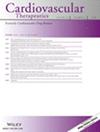L-Carnitine Alleviates the Myocardial Infarction and Left Ventricular Remodeling through Bax/Bcl-2 Signal Pathway
IF 3.4
4区 医学
Q2 CARDIAC & CARDIOVASCULAR SYSTEMS
引用次数: 2
Abstract
Purpose L-carnitine (LC) is considered to have good therapeutic potential for myocardial infarction (MI), but its mechanism has not been clarified. The aim of the study is to elucidate the cardioprotective effects of LC in mice following MI and related mechanisms. Methods ICR mice were treated with LC for 2 weeks after induction of MI with ligation of left anterior descending artery. Electrocardiographic (ECG) recording and echocardiography were used to evaluate cardiac function. H&E staining, TTC staining, and Masson staining were performed for morphological analysis and cardiac fibrosis. ELISA and immunofluorescence were utilized to detect biomarkers and inflammatory mediators. The key proteins in the Bax/Bcl-2 signaling pathway were also examined by Western blot. Results Both echocardiography and histological measurement showed an improvement in cardiac function and morphology. Biomarkers such as LDH, NT-proBNP, cTnT, and AST, as well as the inflammatory cytokines IL-1β, IL-6, and TNF-α, were decreased in plasma of mice receiving LC treatment after myocardial injury. In addition, the expression of α-SMA as well as the key proteins in the Bax/Bcl-2 signaling pathway in cardiac myocardium were much lower in mice with LC treatment compared to those without after MI. Conclusions Our data suggest that LC can effectively ameliorate left ventricular (LV) remodeling after MI, and its beneficial effects on myocardial function and remodeling may be attributable at least in part to anti-inflammatory and inhibition of the Bax/Bcl-2 apoptotic signaling pathway.左旋肉碱通过Bax/Bcl-2信号通路缓解心肌梗死和左心室重构
目的左旋肉碱(LC)被认为对心肌梗死(MI)具有良好的治疗潜力,但其机制尚未阐明。本研究的目的是阐明LC对MI小鼠的心脏保护作用及其相关机制。方法ICR小鼠结扎左前降支诱导心肌梗死后,用LC治疗2周。心电图(ECG)记录和超声心动图用于评估心功能。进行H&E染色、TTC染色和Masson染色进行形态学分析和心脏纤维化。ELISA和免疫荧光法用于检测生物标志物和炎症介质。还通过蛋白质印迹检测了Bax/Bcl-2信号通路中的关键蛋白。结果超声心动图和组织学检查均显示心功能和形态有所改善。心肌损伤后接受LC治疗的小鼠血浆中LDH、NT-proBNP、cTnT和AST等生物标志物以及炎性细胞因子IL-1β、IL-6和TNF-α降低。此外,与未治疗心肌梗死的小鼠相比,LC治疗的小鼠心肌中α-SMA以及Bax/Bcl-2信号通路中的关键蛋白的表达要低得多。结论LC可以有效改善心肌梗死后的左心室重构,其对心肌功能和重塑的有益作用可至少部分归因于抗炎和抑制Bax/Bcl-2凋亡信号通路。
本文章由计算机程序翻译,如有差异,请以英文原文为准。
求助全文
约1分钟内获得全文
求助全文
来源期刊

Cardiovascular Therapeutics
医学-心血管系统
CiteScore
5.60
自引率
0.00%
发文量
55
审稿时长
6 months
期刊介绍:
Cardiovascular Therapeutics (formerly Cardiovascular Drug Reviews) is a peer-reviewed, Open Access journal that publishes original research and review articles focusing on cardiovascular and clinical pharmacology, as well as clinical trials of new cardiovascular therapies. Articles on translational research, pharmacogenomics and personalized medicine, device, gene and cell therapies, and pharmacoepidemiology are also encouraged.
Subject areas include (but are by no means limited to):
Acute coronary syndrome
Arrhythmias
Atherosclerosis
Basic cardiac electrophysiology
Cardiac catheterization
Cardiac remodeling
Coagulation and thrombosis
Diabetic cardiovascular disease
Heart failure (systolic HF, HFrEF, diastolic HF, HFpEF)
Hyperlipidemia
Hypertension
Ischemic heart disease
Vascular biology
Ventricular assist devices
Molecular cardio-biology
Myocardial regeneration
Lipoprotein metabolism
Radial artery access
Percutaneous coronary intervention
Transcatheter aortic and mitral valve replacement.
 求助内容:
求助内容: 应助结果提醒方式:
应助结果提醒方式:


